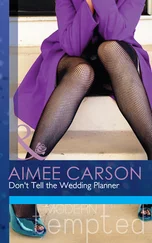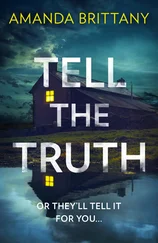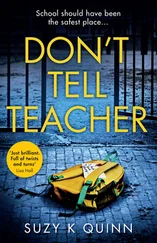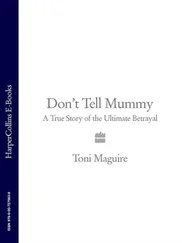Those assembled did not move and did not speak. The silence lasted for long minutes. Then all at once, the stillness was shattered by a violent crack of bullets from a few blocks away. The crowd erupted in sobs and screams.
Mama and Maria and I clung to each other and wept. Poor Auntie Iryna. Would she even know that Borys had been killed?
As the crowd dispersed, I walked with my sister and mother in numb silence, but when we got to our house, I couldn’t bear to go in. I crossed the road to the church instead and stepped into the cool darkness. I lit a candle and said a prayer for Borys and for the others who had been so brutally killed. I stayed there so long that the candle sputtered and died in a pool of wax. My throat was raw from weeping. When I finally stumbled out, it was nearly dusk. I had to go to Borys, to honour his memory.
I walked slowly through the graveyard to get to the wooded area. On my way, I stopped at the two fresh wooden crosses marking where Uncle Roman and Josip were buried. I searched through the earth and found two stones. I placed one on the shoulder of each of the crosses, then chanted under my breath the Vichnaya Pamyat . “Dear Uncle and Cousin,” I said, tears streaming down my face, “I remember and love you.”
I walked into the woods and easily found the fresh pile of dirt covering the newest mass grave. The Volksdeutche with their shovels were gone. It was just me and the souls of the newly dead. I fell to the ground and scrabbled around with my hands until I found a smooth round stone.
I approached the mound and knelt in front of it, placing my stone at the edge and praying for Borys and all of our insurgents. How long did I stay there, kneeling and weeping? Mama came and found me. She helped me to my feet and we stumbled home together.
That night in bed, Maria and I clutched each other and wept. I thought of that false passport with Nathan’s photograph and Bohdan’s name on it. All of the people in today’s mass grave were Ukrainian. How much protection would a false Ukrainian passport get Nathan?
Chapter Sixteen
A Kilogram of Gold
When I was little, Tato told me the story of a frog that was put in a pot of cool water. The pot was put on the stove to simmer, but it heated so gradually that the frog didn’t realize it was being cooked until it was too late. That’s how I felt about the Commandant and his plans for Viteretz. Each of his actions was worse than the last, but then we adjusted.
Gnawing hunger was now normal. People forced into sudden heavy labour was normal. “Subhumans” killed on a whim was normal.
We usually started back to school in September, but the Nazis believed that we “subhumans” only needed enough education to understand their orders, so the schools were closed to us beyond grade four. Anya, the priest’s wife, taught us secretly, but we still had heavy labour and all our chores to do, so learning became hard to fit in.
It made me sick to look at the Commandant or his wife, but whenever I was working in their house I pasted a smile onto my face, dusting and polishing the pretty things I knew they had stolen from their victims. I listened in on conversations whenever I could, hoping to find out something that might help us stay alive.
Our old school had been repaired and painted by labour groups, and was now used by the children of the Germans and Volksdeutche who administered our town. In the nice weather we’d often see them in their Hitler Youth uniforms singing Nazi songs or marching down the street. Marga was a student there. I’d sometimes pass her coming home in the afternoon, looking uncomfortable with her hair twisted into tight blond braids and her uniform so heavily starched that the collar made a red mark on her neck.
The warehouse beside the school was the supply depot for the Volksdeutche Welfare Agency, where the food that had been taken from us was stored. It was also where the clothing and items taken from the executed were kept. As I watched endless wagonloads of goods arriving at that warehouse, it made me wonder if this same thing was happening in every town and city that had been conquered by the Nazis. I dreamed of breaking in and opening the doors wide, so that the stolen food and goods could be given to those who needed them so desperately.
The Nazis acted as if we needed lots of police, yet it seemed that their job was to terrorize us, not to provide law and order.
The police who most frightened me were the ones in grey-green uniforms. They came from Germany and they had guns. It was police like these who had executed Borys and our insurgents. There were uniformed Volksdeutche as well, who also had guns. And Nazis had formed local groups of auxiliary police, so we had Polish, Ukrainian and Jewish police who wore arm bands instead of uniforms. Some of the Ukrainian and Polish police carried guns, but the Jewish police didn’t — only batons.
Even walking on the street became hazardous. Once I was coming home from the Commandant’s when an elderly Volksdeutche man — I think he was the new postmaster — shook his cane and cursed at two young Polish women as they walked past him. I didn’t know either woman’s name, but I recognized one as a bakery clerk. The other looked as if she could be the clerk’s younger sister. Both kept their eyes cast down as they passed the man, as if trying to ignore his harsh words. A Nazi policeman was passing just then and he stopped, looked from the women to the old man and asked, “What did they do?”
“That one, she’s a traitor,” said the man, pointing at the older of the two.
The policeman pulled out his gun and shot her in the skull. She crumpled to the ground.
I stood, frozen in place, as the younger woman knelt and cradled her sister’s bloodied head. “Why did you shoot her?” she shouted at the policeman. “She did nothing wrong.” The policeman raised his gun again and shot her in the head too.
I thought maybe the man who had accused the woman would be horrified at the violence he had caused, but when I looked at his face, all I saw was a satisfied smirk.
The policeman looked at the man, then at me — the other witness to what he’d just done. He raised his gun and aimed it at my head. “Leave.”
In a haze of shock, I walked right past the two dead sisters and the smirking man. When I got home, Mama held me in her arms as I wept. “I didn’t help them, Mama,” I sobbed. “I just stood there, watching.”
“What is it you thought you could do ?” she asked. “The women were already dead. And the policeman very nearly shot you.”
Her words didn’t make me feel any better. I went to the bedroom and ran my fingers over Mama and Tato’s wedding portrait. Tato stared out at me, and I felt the disappointment in his eyes. He had wanted me to be brave, to do what was right, but instead I had walked away, not even saying anything to the policeman.
I clasped the portrait to my heart and lay down on the bed, not to sleep, but just to think. Mama was right — I knew that. If I had intervened, I would have been shot. But there had to be a way to fight back. We were doing what we could, but it wasn’t enough.
* * *
It was nearly dusk on the last Monday of September and we needed more water. “Go with your sister, Krystia,” said Mama. “I don’t like either of you being out alone this late.”
As we carried the water pail to the pump, I glanced over at Maria. It’s funny how you can live with someone, even sleep in the same bed, but not pay attention to the subtle changes that happen over time. I hadn’t really looked at Maria since the Hunger Plan had started. I still thought of her as my chubby-cheeked baby sister, but her face now looked almost gaunt. I glanced down at our two hands side by side, holding the water pail. They looked like leather on bone.
Читать дальше
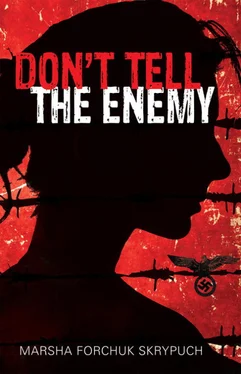

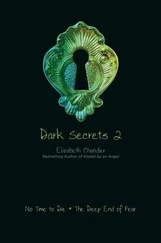
![Quiet Billie - Don't mistake the enemy [СИ]](/books/421973/quiet-billie-don-t-mistake-the-enemy-si-thumb.webp)




